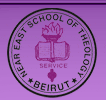N.E.S.T. Newsletter – December 2019
 What are the Lebanese Protesting About?
What are the Lebanese Protesting About?
Dr. George Sabra, President, Near East School of Theology
Since Thursday October 17, 2019 a spontaneous popular uprising has been spreading all over Lebanon’s
cities and towns. Thousands upon thousands of people have gathered in public squares, on streets and roads
to vent their anger against the corruption of the ruling political class that has led the country not just to the
brink of, but to actual economic and financial collapse. Decades of corruption, mismanagement of the country’s
economic problems, and sectarian power struggle have led to this situation, and the people are fed up.
The Lebanese rose up in a popular movement that mobilized young and old, men and women, Christians and Muslims, and they have been protesting and demonstrating for the last two months.
One can analyze the causes of the present crisis from a variety of perspectives: economic, financial, social, and political. And there is no end to such analyses daily on TVs, talkshows, panel discussions, lectures, newspapers, social media, etc. The key words are: corruption, social injustice, and thieving. But why are some people corrupt? Why do they steal and rob other people? Why are those in power and in control of economic and financial resources insensitive to social injustice? Theologians also bring their perspective on the crisis, not in place of, but in addition to, the other perspectives. The root of the crisis is love of money, or Mammon, as the New Testament puts it – the Semitic term for wealth and riches. Mammon is the god of many in the ruling class in this country, their guarantor of security, their means to more power, the god whom they seek and love and in whom they take refuge. Those in power have an insatiable desire for wealth, and so they seize every opportunity to accumulate money and increase their riches, regardless of the morality or immorality of their ways and dealings, and irrespective of the injustice that their greed causes for individuals, society and the whole country.
The word of God in the Bible is an ongoing battle against false gods and against injustice and oppression of the poor. The shouts and cries of the Lebanese protesters against corruption and injustice ring very similar to those of the biblical prophets: We read that God punishes Israel and its leaders “because they sell the righteous for silver, and the needy for a pair of shoes – they trample the head of the poor into the dust of the earth, and turn aside the way of the afflicted” (Amos 2:6-7); “Woe to those who devise wickedness and work evil upon their beds! When the morning dawns they perform it, because it is in the power of their hand. They covet fields and seize them, and houses and take them away; they oppress a man and his house.” (Micah 2:1-2); “They do not know how to do right… those who store up violence and robbery in their strongholds.” (Amos 3:10). And one could go on and on citing similar prophetic denunciations of the powerful and wealthy and corrupt.
The final word was uttered by Jesus: “You cannot serve God and money.” (Mt. 6:24)
How can a seminarian not protest with the Lebanese?
